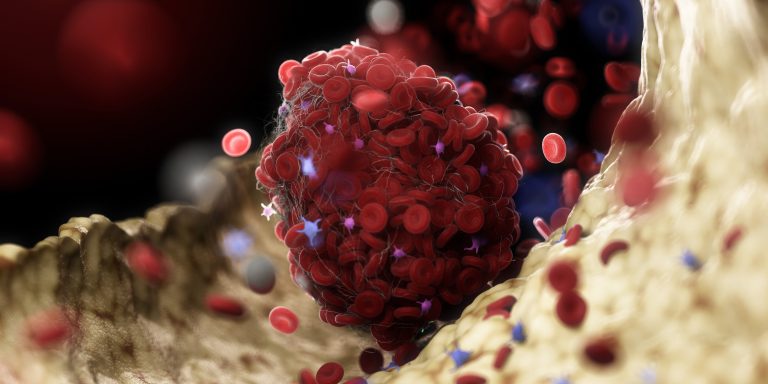
SARS-CoV-2 infection induces functional changes in platelets that make them more likely to aggregate and cause clots, according to a recent study by researchers at the University of Utah. Those changes may explain some the disease’s most dangerous complications, such as heart attacks and strokes.
Until now, little was known about how infection with the virus can lead to platelet aggregation, which is an important component of thrombosis. But the Utah team’s findings suggest that inflammatory proteins produced during COVID-19 infection make platelets hyperreactive and likelier to form blood clots via platelet to platelet and platelet to leukocyte interactions. A better understanding of how such clots arise, they say, could lead to new treatments to protect COVID-19 patients from these potentially deadly complications.
The Utah research team’s report appeared recently in Blood, an American Society of Hematology journal.
“Our finding adds an important piece to the jigsaw puzzle that we call COVID-19,” says Robert A. Campbell, Ph.D., senior author of the study and an assistant professor in the Department of Internal Medicine. “We found that inflammation and systemic changes, due to the infection, are influencing how platelets function, leading them to aggregate faster, which could explain why we are seeing increased numbers of blood clots in COVID patients.”
Blood clotting leading to cardiovascular problems and organ failure is particularly common among COVID patients with underlying medical problems such as diabetes, obesity, or high blood pressure.
To better understand what causes the clotting, the researchers studied 41 COVID-19 patients hospitalized at University of Utah Hospital in Salt Lake City. Seventeen of these patients were in the ICU, including nine who were on ventilators. The researchers compared blood from these patients with samples from healthy individuals who were matched for age and sex.
Using differential gene analysis, they found altered platelet gene expression and functional responses in patients infected with SARS-CoV-2, the virus that causes COVID-19. RNA sequencing demonstrated distinct changes in the gene expression profiles of COVID-19 patients’ circulating platelets. Pathway analysis revealed differential gene expression changes in pathways associated with protein ubiquitination, antigen presentation and mitochondrial dysfunction.
Further, they found that the platelets of patients with COVID-19 aggregated more readily. These changes significantly altered how platelets interacted with the immune system, likely contributing to inflammation of the respiratory tract, which can result in more severe lung injury.
Notably, the SARS-CoV-2 binding receptor, ACE2, was not detected in platelets of infected patients. However, mRNA from the SARS-CoV-2 N1 gene was detected in platelets from 2/25 COVID-19 patients, suggesting platelets may take-up SARS-COV-2 mRNA independent of ACE2.
Resting platelets from COVID-19 patients had increased P-selectin expression basally and upon activation. Circulating platelet-neutrophil, -monocyte, and -T-cell aggregates were all significantly elevated in COVID-19 patients compared to healthy donors. Furthermore, platelets from COVID-19 patients aggregated faster and showed increased spreading on both fibrinogen and collagen.
The researchers attributed the increase in platelet activation and aggregation partly to increased MAPK pathway activation and thromboxane generation. “These findings,” they write, “demonstrate that SARS-CoV-2 infection is associated with platelet hyperreactivity which may contribute to COVID-19 pathophysiology.”
Bhanu Kanth Manne, Ph.D., one of the study’s lead authors and a research associate with the University of Utah Molecular Medicine Program (U2M2) says that inflammation, due to the infection, could be affecting megakaryocytes, the cells that produce platelets. As a result, critical genetic alterations are being passed down from megakaryocytes to the platelets, which in turn, makes them hyperactive.
The researchers also found that pre-treating platelets in samples from SARS-CoV-2 infected patients with aspirin prevented this hyperreactivity. Those findings suggest aspirin may improve outcomes; however, this requires further study in clinical trials. For now, Campbell warns against using aspirin to treat COVID-19 unless recommended by a physician.
Members of the University of Utah research team are now looking for treatments that protect against thrombotic complications after COVID-19 infection.
“There are genetic processes that we can target that would prevent platelets from being changed,” Campbell says. “If we can figure out how COVID-19 is interacting with megakaryocytes or platelets, then we might be able to block that interaction and reduce someone’s risk of developing a blood clot.”













